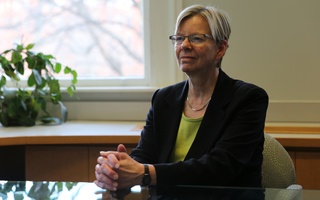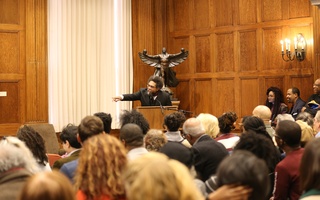{shortcode-da8b4a18b85233c9be99cfdddf93147628c06c93}UPDATED: September 7, 2017 at 5:02 p.m.
Amid peaceful protest and a heavy security presence, controversial sociologist Charles A. Murray ’65 discussed his scholarship and President Donald Trump’s election at an event intended to “test” the boundaries of free speech on campus.
Murray, whose work alleging race can be linked to IQ disparities has been denounced as “racist pseudoscience” by the Southern Poverty Law Center, spoke to a crowd of nearly 300 at the Harvard Mineralogical and Geological Museum. Outside of the venue, several dozen undergraduates gathered to protest Murray’s appearance at event called “Speak Out Against White Supremacy.”
Protesters criticized the Open Campus Initiative—a group that invites what some say are hateful speakers, including Murray, to speak—for giving a platform to racist ideology.
Nicholas P. Whittaker ’19, a member of the Undergraduate Council’s Black Caucus who organized the protest, said that the Open Campus Initiative gave Murray an “unchecked platform for white supremacy and transphobia” by inviting him to campus.
Taya Cowan ’21, another protester, said she felt that Murray’s sentiments should not be welcome at Harvard’s campus, and that his invitation reaffirmed her belief that “the world isn’t safe” for her as a black woman.
Conor Healy ’19, the president of the Open Campus Initiative, said Wednesday that the group “only invite[s] people whom we believe have something to add to academic and intellectual discourse on this campus.”
Inside the lecture hall, Murray discussed his most recent book, “Coming Apart: The State of White America 1960-2010,” which looks to analyze modern-day class dynamics in the United States.
While fielding pre-screened questions from the audience, Murray responded to one student who asked outright whether he was a white supremacist.
His response was brusque: “I am sick unto death of trying to prove a negative,” he said, adding that he thought his best-known book “The Bell Curve,” which claims that disparities in intelligence can be linked to race, does not actually claim that white men are intellectually superior to other groups.
Midway through Murray’s talk, about ten students in the audience rose and held signs, one of them reading “white nationalist,” before walking out of the lecture to attend a faculty panel organized by the nearby protesters.
At the faculty panel, hosted directly after the student protest, History and African and African American Studies professor Walter Johnson strongly condemned Murray’s beliefs.
“Charles Murray is like a Confederate statue on wheels,” he said. “His work is empirically discredited, overtly racist, and over twenty years old, a relic of the culture wars of the 1990s.”
The counter-events were tame compared to the demonstration sparked by a speech Murray was scheduled to give at Middlebury College in March. Still, the memory of the Middlebury incident, which drew national attention and briefly turned violent, cast a shadow over the event.
Murray himself joked about his Middlebury appearance after the students who held up signs departed the room.
“This is way better than Middlebury,” Murray said. “I appreciate the way that was done.”
And after the event, Murray Tweeted, “Harvard did itself proud. Attentive audience, tough questions, super-professional security. Congrats & thanks to @harvardfree.”
—Staff writer Brandon J. Dixon can be reached at brandon.dixon@thecrimson.com. Follow him on Twitter @BrandonJoDixon.
—Staff writer Anna M. Kuritzkes can be reached at anna.kuritzkes@thecrimson.com. Follow her on Twitter @AnnaKuritzkes.
This article has been revised to reflect the following correction:
CORRECTION: September 7, 2017
A previous version of this story incorrectly indicated the number of attendees at the event.
Read more in College News
Sanctions Faculty Committee Quietly Resumes MeetingRecommended Articles
-
 Former Dean Murray Returns to SEAS After Energy Department Post
Former Dean Murray Returns to SEAS After Energy Department Post -
 Harvard Professors Sign Statement Endorsing ‘Freedom of Expression’
Harvard Professors Sign Statement Endorsing ‘Freedom of Expression’ -
In Support of Free Expression on College CampusesThis freedom of expression motion reminds all parties involved that the pursuit of truth is a collaborative one, and that groups with conflicting ideas should seek to understand rather than simply antagonize each other.
-
 Charles Murray, Controversial Alum, Set to Speak at Harvard
Charles Murray, Controversial Alum, Set to Speak at Harvard -
Charles Murray Doesn't Belong HereAt this political moment when the very humanity of people of color in this country is being questioned and white supremacy is at the forefront of American political discourse, students ought to stand with their vulnerable peers of color, and other marginalized persons, on this campus.













